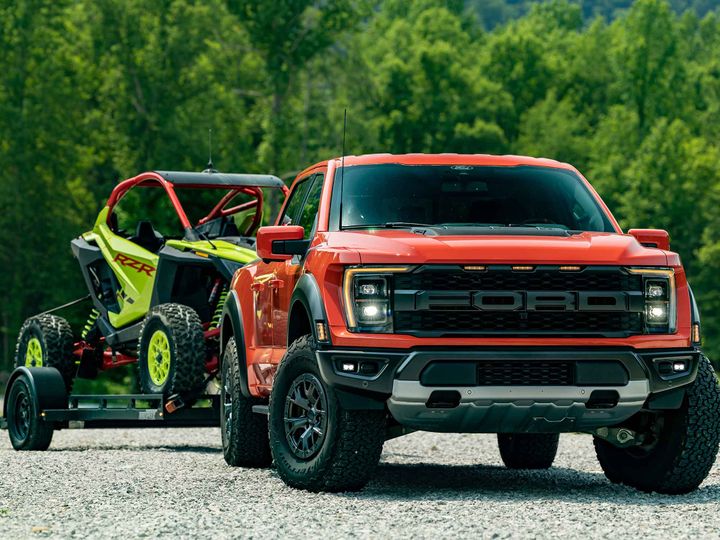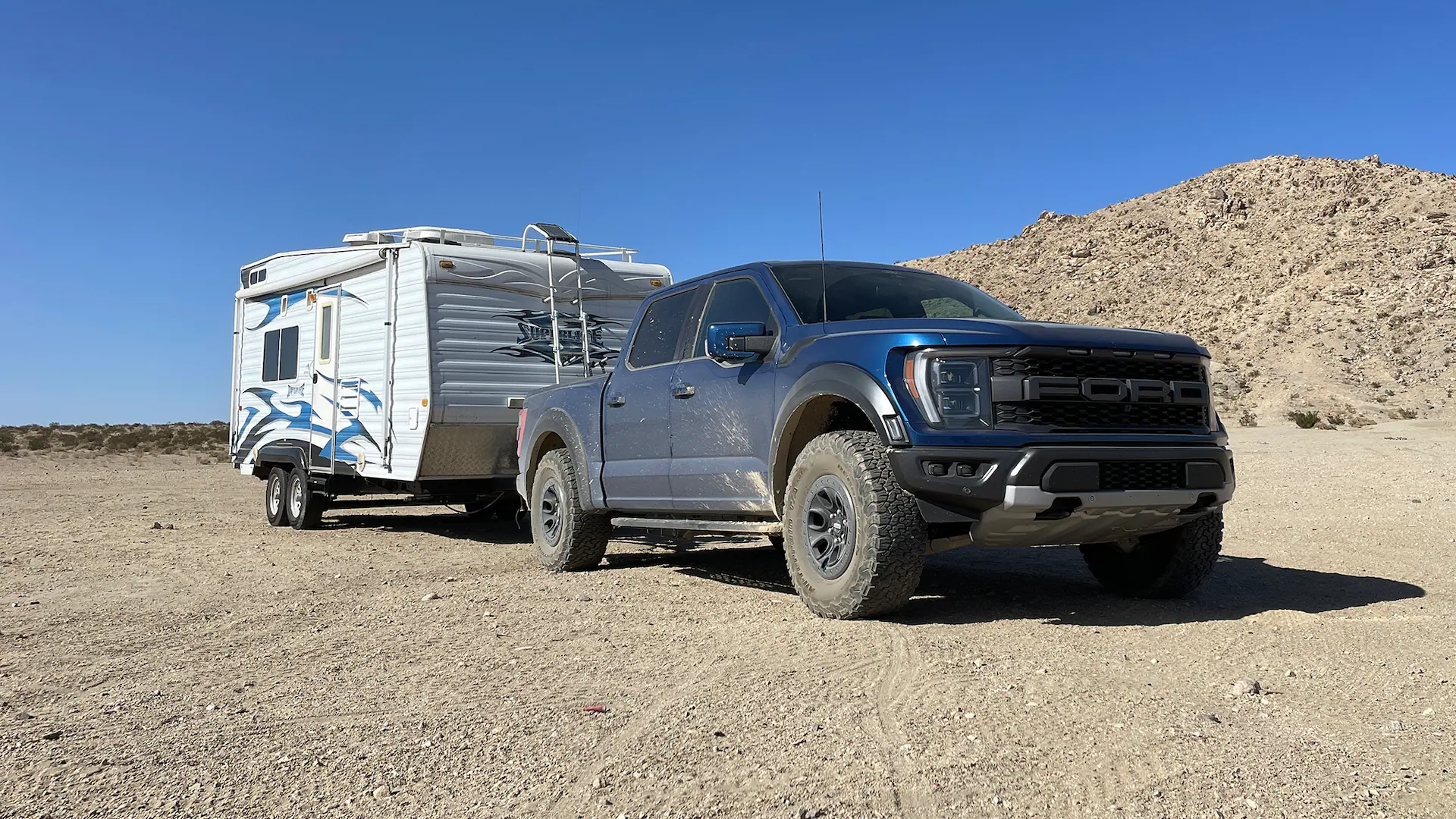


The Ford Raptor is a high-performance off-road pickup truck that has captured the attention of adventure seekers and outdoor enthusiasts alike. With its rugged design, powerful engine options, and advanced suspension system, the Raptor is built to conquer even the most challenging terrains. However, beyond its off-road prowess, the Raptor also boasts impressive towing capabilities, making it a versatile choice for those who need to haul heavy loads. In this comprehensive article, we will explore the Ford Raptor's towing capacity specifications, factors affecting its towing ability, essential towing equipment and accessories, safety practices, real-world experiences, and how it compares to other towing vehicles.

The latest generation of the Ford Raptor, introduced in 2021, offers a maximum towing capacity that varies based on several factors. Here's a breakdown of the towing capacity specifications:
| Cab Configuration | Maximum Towing Capacity |
|---|---|
| SuperCrew | 8,200 lbs (3,719 kg) |
| SuperCab (Previous Gen) | 6,000 lbs (2,722 kg) |
| SuperCrew (Previous Gen) | 8,000 lbs (3,629 kg) |
| Raptor R (2021) | 8,700 lbs (3,946 kg) |
While the Raptor's towing capacity is impressive for an off-road-focused vehicle, it falls short of some dedicated towing vehicles in its class. For example:
Ram 3500 Heavy Duty: Up to 37,090 lbs (16,826 kg)
Ford F-350 Super Duty: Up to 32,900 lbs (14,923 kg)
Several factors contribute to the Ford Raptor's towing capacity, including:
The Raptor is equipped with either:
A high-output 3.5-liter EcoBoost V6 engine producing 450 horsepower and 510 lb-ft of torque
An optional 5.2-liter supercharged V8 engine (Raptor R) with 700 horsepower and 640 lb-ft of torque
These powerful engines, combined with a 10-speed automatic transmission and four-wheel drive, provide the necessary muscle for towing heavy loads. The engine's torque output and the transmission's gear ratios play a crucial role in determining the Raptor's towing capacity.
The Raptor's unique off-road capabilities, such as its high-performance suspension system with Fox internal-bypass dampers and a five-link rear coil-spring setup, may impact its towing capacity compared to other trucks designed primarily for towing. The suspension is optimized for off-road performance, which can affect its ability to handle heavy loads over extended periods or on rough terrain.
The chassis design and weight distribution also play a crucial role in determining the Raptor's towing capacity. A well-balanced chassis with a lower center of gravity and proper weight distribution can improve stability and handling when towing heavy loads.
The Ford Raptor comes equipped with the following standard towing equipment:
Class IV trailer hitch receiver
Smart trailer tow connectors
Front and rear tow hooks
The Class IV trailer hitch receiver is designed to handle up to 10,000 pounds of gross trailer weight, making it suitable for most towing scenarios within the Raptor's capacity. The smart trailer tow connectors ensure proper electrical connectivity between the truck and the trailer, enabling the use of trailer lights, brakes, and other essential systems.
Ford offers various optional towing accessories to enhance the towing experience and improve safety when towing heavy loads, including:
Weight distribution systems
Brake controllers
Trailer backup assist systems
Weight distribution systems help distribute the trailer's tongue weight evenly across the truck's axles, improving stability and handling. Brake controllers allow the truck's braking system to engage the trailer's brakes, providing better control and shorter stopping distances when towing heavy loads. Trailer backup assist systems use cameras and sensors to provide guidance and assistance when reversing with a trailer, making it easier to maneuver in tight spaces or navigate challenging terrain.
Proper load distribution, adhering to weight limits, and following safe driving techniques are crucial for safe towing with the Ford Raptor.
Load Distribution and Weight Limits:
Evenly distribute the load in the trailer to prevent instability and improve handling.
Adhere to the manufacturer's recommended weight limits to avoid issues such as reduced vehicle control, increased stopping distances, mechanical failures, and potential accidents.
Driving Techniques and Terrain Considerations:
Allow for longer stopping distances and wider turns when towing heavy loads.
Consider the terrain and weather conditions, as off-road conditions may require additional precautions and adjustments.
Maintenance and Equipment Checks:
Regularly maintain the vehicle and towing equipment to ensure optimal condition.
Inspect tires, brakes, suspension, trailer lights, brakes, and hitch connections before embarking on a towing journey.
Many Ford Raptor owners have shared their experiences and reviews regarding the truck's towing capabilities. While some praise the Raptor's power and ability to tow moderate loads, others have expressed concerns about the suspension's impact on towing stability, particularly with heavier trailers or over rough terrain.
Some owners have reported sagging or squatting in the rear suspension when towing near the maximum capacity, which can affect handling and control. To mitigate this issue, many recommend using a weight distribution hitch or additional suspension upgrades, such as airbags or stiffer springs, when towing heavy loads.

While the Ford Raptor offers impressive towing capabilities for an off-road-focused vehicle, it may not be the ideal choice for those who prioritize towing over off-road performance. Heavy-duty pickup trucks like the Ford F-250 Super Duty or Ram 2500 Heavy Duty are designed specifically for towing and hauling, with higher towing capacities, stiffer suspensions, and more robust towing equipment.
These dedicated towing vehicles often feature stronger frames, beefier suspension components, and more powerful engines, allowing them to handle significantly heavier loads than the Raptor. However, they may sacrifice some off-road capabilities and ride comfort in favor of increased towing prowess.
For those who need a balance between off-road capabilities and towing performance, the Ford F-150 Tremor or Ram 1500 TRX might be better alternatives. These trucks offer enhanced off-road features while maintaining respectable towing capacities, typically ranging from 10,000 to 13,000 pounds (4,536 to 5,897 kg).
While not as capable as the Raptor in extreme off-road situations, these vehicles provide a good compromise for those who need to tow moderate loads while still enjoying some off-road adventures. They often feature upgraded suspension systems, skid plates, and other off-road-focused components, making them more capable than traditional pickup trucks in challenging terrain.
Conclusion
The Ford Raptor is a versatile and capable off-road pickup truck that offers respectable towing capabilities. While it may not match the towing prowess of dedicated towing vehicles, the Raptor can handle moderate towing tasks with the appropriate equipment and precautions. By understanding its towing capacity, limitations, and best practices, Raptor owners can enjoy the thrill of off-road adventures while having the ability to tow their gear and equipment safely. Whether hauling a trailer for camping, transporting off-road vehicles, or towing a boat, the Raptor provides a unique combination of off-road performance and towing capability that sets it apart from traditional pickup trucks.
The latest generation Ford Raptor (2021) has a maximum towing capacity of 8,700 lbs (3,946 kg) for the Raptor R model and 8,200 lbs (3,719 kg) for the standard SuperCrew model.
The Raptor's towing capacity is impressive for an off-road focused vehicle, but it falls short of dedicated towing trucks like the Ram 3500 Heavy Duty (up to 37,090 lbs) and Ford F-350 Super Duty (up to 32,900 lbs).
The Raptor's engine power, transmission, suspension design, chassis, and weight distribution all contribute to its towing capacity. Its off-road focused suspension may impact towing stability compared to dedicated towing trucks.
Yes, Ford recommends using a weight distribution hitch when towing near the Raptor's maximum capacity to improve stability and handling.
When towing around 1,500 kg, the Raptor can achieve fuel economy of around 11.8L/100km, which is better than some other trucks in its class.
While the Raptor can handle moderate towing tasks, it may not be the ideal choice for those who prioritize towing over off-road performance or need to tow frequently over long distances.
The Raptor's towing capacity is lower than some other off-road focused trucks like the Ford F-150 Tremor or Ram 1500 TRX, which offer towing capacities ranging from 10,000 to 13,000 lbs.
There are no official modifications from Ford to increase the Raptor's towing capacity. Some owners may consider aftermarket suspension upgrades, but this could potentially void warranties.
Proper load distribution, adhering to weight limits, allowing for longer stopping distances, and regular maintenance of the vehicle and towing equipment are recommended for safe towing with the Raptor.
Owners report feeling the trailer more when towing with the Raptor's softer suspension compared to a traditional leaf-sprung truck, but the Raptor's off-road capabilities make it more comfortable on rough terrain.

Sarah isn't your average gearhead. With a double major in Mechanical Engineering and Automotive Technology, she dived straight into the world of car repair. After 15 years of turning wrenches at dealerships and independent shops, Sarah joined MICDOT to share her expertise and passion for making cars run like new. Her in-depth knowledge and knack for explaining complex issues in simple terms make her a valuable asset to our team.



